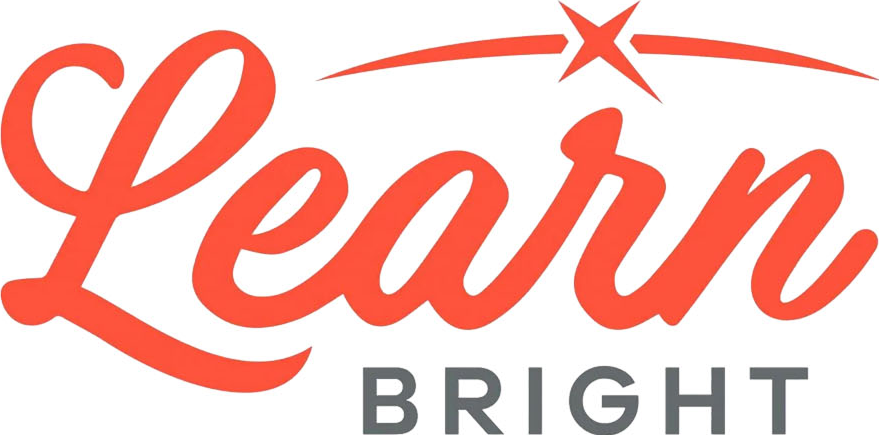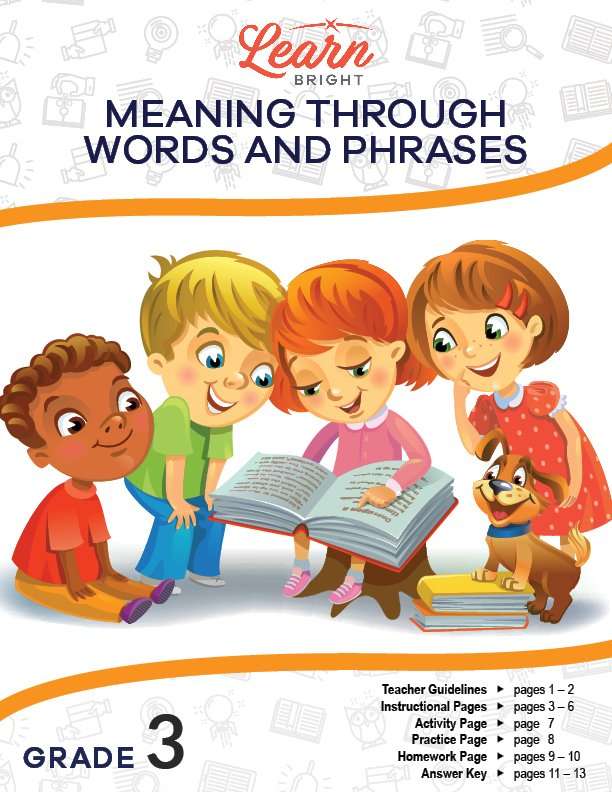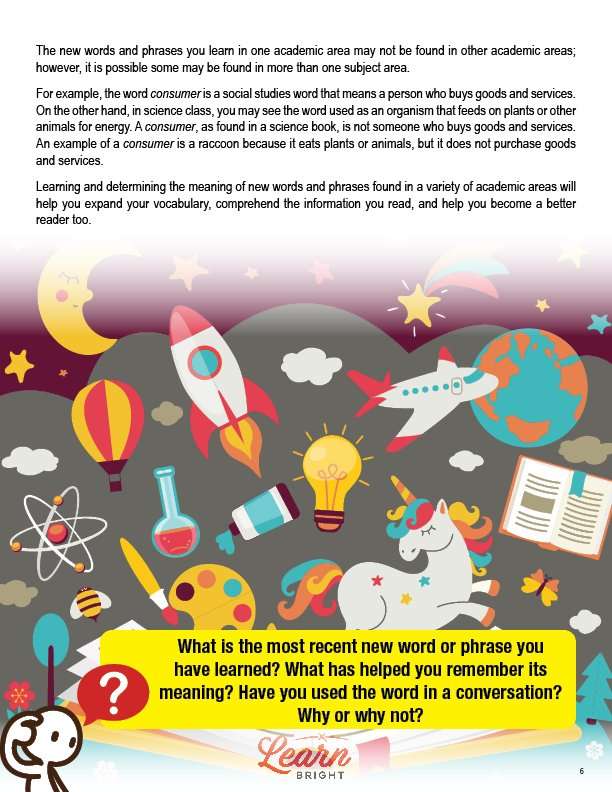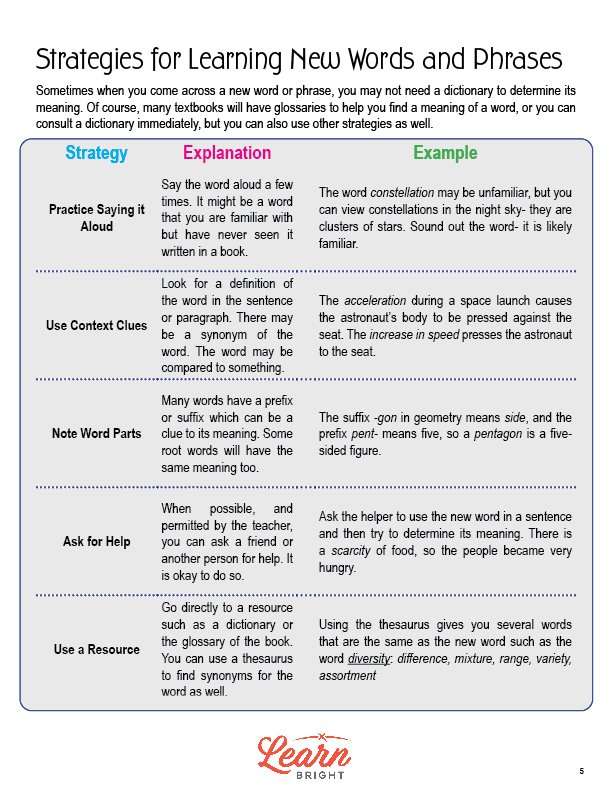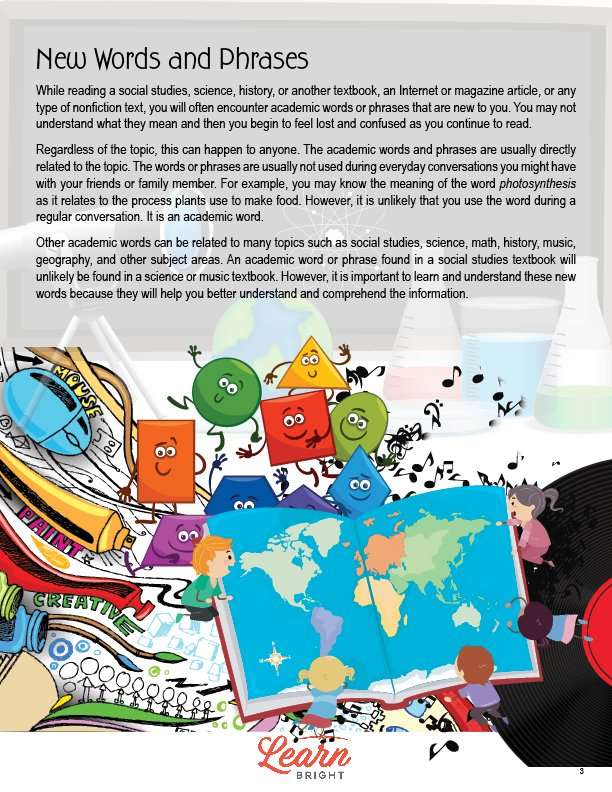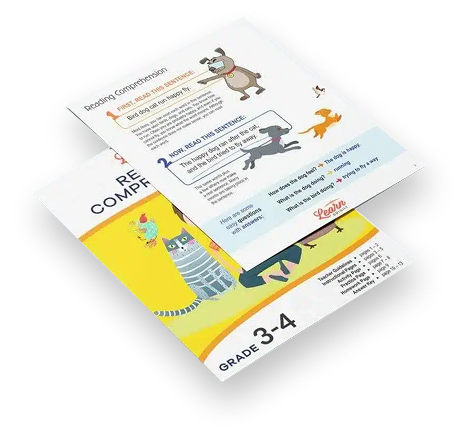Description
What our Meaning Through Words and Phrases – Grade 3 lesson plan includes
Lesson Objectives and Overview: Meaning Through Words and Phrases – Grade 3 teaches students strategies for finding the meaning of new words in text. At the end of the lesson, students will be able to determine the meaning of general academic and domain-specific words and phrases in a text relevant to a grade 3 topic or subject area.
Classroom Procedure
Every lesson plan provides you with a classroom procedure page that outlines a step-by-step guide to follow. You do not have to follow the guide exactly. The guide helps you organize the lesson and details when to hand out worksheets. It also lists information in the yellow box that you might find useful. You will find the lesson objectives, state standards, and number of class sessions the lesson should take to complete in this area. In addition, it describes the supplies you will need as well as what and how you need to prepare beforehand. The supplies that you will need for this lesson are dictionaries and the handouts. To prepare for this lesson ahead of time, you can gather the supplies, copy the handouts, and pair the students for the lesson activity.
Options for Lesson
Included with this lesson is an “Options for Lesson” section that lists a number of suggestions for activities to add to the lesson or substitutions for the ones already in the lesson. The first optional addition suggests that you can let students choose their own words and phrases for the activity worksheet. Another optional addition to this lesson is to assign students a passage to read and find five new words to define. You can also read a higher-level passage to the class and have your students raise their hands every time you say a word that they don’t understand; you can then discuss how you can find the meaning of that word.
Teacher Notes
The teacher notes page includes a paragraph with additional guidelines and things to think about as you begin to plan your lesson. This page also includes lines that you can use to add your own notes as you’re preparing for this lesson.
MEANING THROUGH WORDS AND PHRASES – GRADE 3 LESSON PLAN CONTENT PAGES
New Words and Phrases
The Meaning Through Words and Phrases – Grade 3 lesson plan includes four pages of content. The lesson begins by explaining that students will often find words in textbooks or other nonfiction sources that they don’t already know. This can make it difficult for them to understand the meaning of the text as a whole, and can lead to them feeling confused or lost. These words might be academic words, which means that we don’t use them very often in everyday conversations or in our day-to-day lives. For example, we use the word photosynthesis when speaking or writing about specific science topics but we wouldn’t usually use it in a conversation with a friend. You can find these words in texts related to science, social science, math, geography, history, music, and more. It’s important to learn how to define these words.
The lesson then provides some examples of academic words and phrases that students might encounter related to different disciplines. They include math (quadrilateral, congruent, polygon), science (natural resource, atmosphere, kinetic energy), social studies (entrepreneur, Pony Express, canal), music (rhythm, melody, pitch), and art (texture, line, primary colors).
While reading informational nonfiction text, it’s important to pay attention to the words that you don’t recognize. Sometimes, special vocabulary words will be in bold. To find out what these words mean, you can use a dictionary, glossary, or other strategies.
Strategies for Learning New Words and Phrases
The lesson then delves into some of the strategies that you can use to learn the meaning of new words and phrases. The lesson includes a helpful chart that lists the strategy, an explanation of the strategy, and some examples.
The first strategy is to practice saying the word aloud. By doing this, you may realize that you do know the word already but have never seen it written down before so you didn’t recognize it. The second strategy is to use context clues. This means that you should look for a definition of the word in the sentence or paragraph that you found it in. You might find a synonym or comparison to something else that will give you an idea of what the word means. The third strategy is to note word parts. Many words have prefixes, suffixes, or roots that can help you figure out what the word means.
The fourth strategy is to ask for help. A friend or someone else might know what the unfamiliar word means. The fifth, and final, strategy is to use a resource. You can use a dictionary or the glossary of the book to find the definition of the word. Thesauruses can also be a great resource.
Not all words you find in one subject area will be used in another, but some will! For example, the word consumer is found in multiple contexts but means different things in social studies and in science. In social studies, it means a person who buys goods or services. In science, it means an organism that feeds on plants or animals for energy. Understanding the different uses in different contexts is also important. Developing all of these skills is a great way to improve your reading comprehension!
MEANING THROUGH WORDS AND PHRASES – GRADE 3 LESSON PLAN WORKSHEETS
The Meaning Through Words and Phrases – Grade 3 lesson plan includes three worksheets: an activity worksheet, a practice worksheet, and a homework assignment. You can refer to the guide on the classroom procedure page to determine when to hand out each worksheet.
CREATE PARAGRAPHS ACTIVITY WORKSHEET
Students will work with a partner to complete the activity worksheet. They will write two paragraphs that use each provided set of words. They must include context clues in their paragraphs to help readers figure out the meaning of the word or words. Students can use a dictionary for help if they need to.
Students may work either alone or in larger groups if you’d prefer.
WORD MEANING PRACTICE WORKSHEET
For the practice worksheet, students will first read a passage and then determine the meaning of the bold words. They will add the words to the provided chart and will list the word, the meaning, and what helped them determine the meaning of the word.
MEANING THROUGH WORDS AND PHRASES HOMEWORK ASSIGNMENT
The homework assignment asks students to read the text and answer the questions that go along with it. These questions will test their reading comprehension and their understanding of the lesson material.
Worksheet Answer Keys
This lesson plan includes answer keys for the practice worksheet and the homework assignment. If you choose to administer the lesson pages to your students via PDF, you will need to save a new file that omits these pages. Otherwise, you can simply print out the applicable pages and keep these as reference for yourself when grading assignments.
